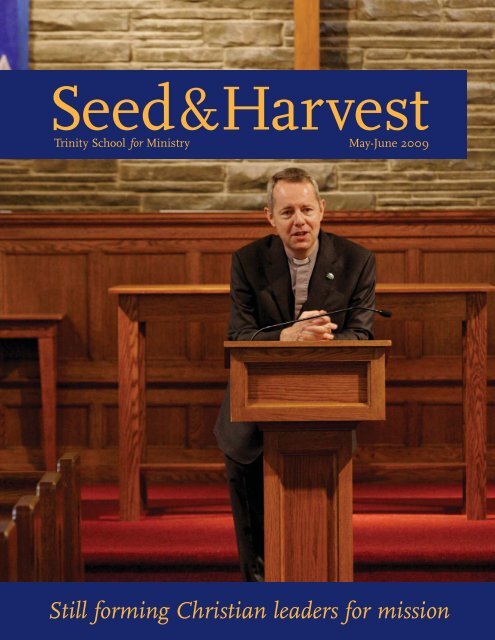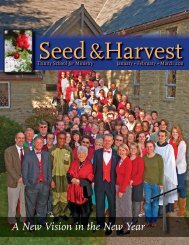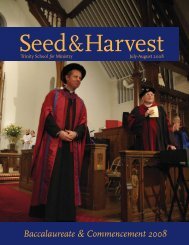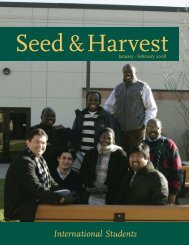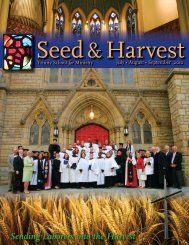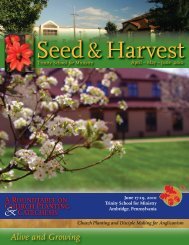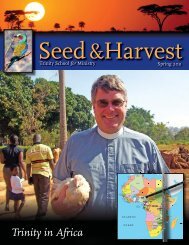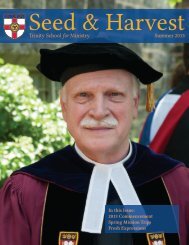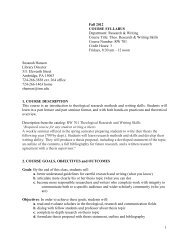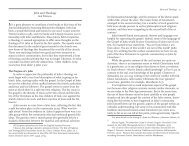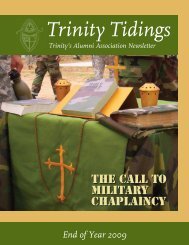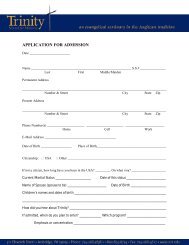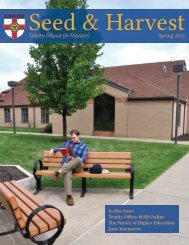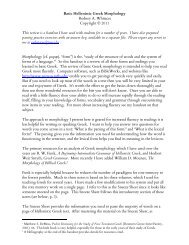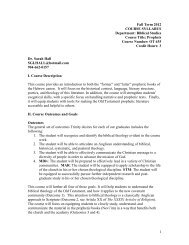May-June 2009.pdf - Trinity School for Ministry
May-June 2009.pdf - Trinity School for Ministry
May-June 2009.pdf - Trinity School for Ministry
Create successful ePaper yourself
Turn your PDF publications into a flip-book with our unique Google optimized e-Paper software.
Seed& Harvest<br />
<strong>Trinity</strong> <strong>School</strong> <strong>for</strong> <strong>Ministry</strong> <strong>May</strong>-<strong>June</strong> 2009<br />
Still <strong>for</strong>ming Christian leaders <strong>for</strong> mission
In This Issue<br />
Volume XXXII Number 3<br />
2 From the Dean and President<br />
by Justyn Terry<br />
3 How is <strong>Trinity</strong> Faring in the<br />
Financial Downturn?<br />
by Justyn Terry<br />
4 Non-Residential Masters Degrees<br />
by Grant LeMArquand<br />
5 Curriculum Review at <strong>Trinity</strong>:<br />
Re-Forming the Formation of<br />
Leaders<br />
by Travis Hines<br />
7 The Bamboo Bids Adieu<br />
by Bill Starke<br />
8 <strong>Trinity</strong> in Tunisia<br />
by Les Fairfield<br />
10 Recommendations <strong>for</strong> Summer<br />
Reading – from some of <strong>Trinity</strong>’s<br />
faculty<br />
12 <strong>June</strong> 2009 at <strong>Trinity</strong><br />
13 Fairfield Homecoming<br />
14 Go! Go! Go!<br />
15 Annual Fund Thermometer<br />
Upcoming <strong>Trinity</strong> Events<br />
16 Prayer <strong>for</strong> <strong>Trinity</strong><br />
From the Dean and President<br />
Dear Friends,<br />
Welcome to another edition of Seed & Harvest.<br />
There’s a little something <strong>for</strong> everyone in this<br />
issue.<br />
One of the articles is about something that we<br />
believe will help us equip many people <strong>for</strong><br />
mission in this country and overseas: revised<br />
MAR and MAME (now MA in Mission)<br />
degrees that can be taken non-residentially.<br />
They can also lead to an MDiv which can be<br />
Dean Terry<br />
completed with one year of residency. This is<br />
an exciting development that many of our supporters have been keen to see<br />
us provide.<br />
Whilst I am delighted that we can now offer these degrees, I do want to reaffirm<br />
our continuing commitment to residential training wherever possible.<br />
There is something about spending three or four years in the company of<br />
others preparing <strong>for</strong> ordained leadership responsibilities in the church that<br />
cannot be entirely replicated online or in summer and winter intensives.<br />
The knowledge, skills and character <strong>for</strong>mation that we seek to impart at<br />
<strong>Trinity</strong> are all communicated personally. Faculty, staff and students share<br />
their lives as they worship, study and eat together; education is going on all<br />
the time. We wrestle with the great issues of the faith in an intentional community<br />
committed to the Gospel of Jesus Christ, to the supreme authority of<br />
Scripture, to the lordship of the Holy Spirit and to the need <strong>for</strong> evangelism<br />
and discipleship. This is, I believe, the best way to gain the knowledge and<br />
skills we need <strong>for</strong> the demands of Christian ministry.<br />
We also have the joy of seeing the character of our students develop at<br />
<strong>Trinity</strong>. These highly committed men and women mature be<strong>for</strong>e our eyes.<br />
This is rarely seen from one day to the next, but it is evident from one year<br />
to the next. Our graduates have a greater maturity, depth, and humble<br />
confidence than they had when they first came.<br />
On the cover:<br />
Dean and President Justyn<br />
Terry speaking in Chapel during<br />
Be a Seminarian <strong>for</strong> a Day.<br />
Photo by Jim Beavers<br />
<br />
So whilst we gladly offer these new non-residential masters degrees, we<br />
continue to encourage people to immerse themselves in residential training<br />
if at all possible. It is a great investment <strong>for</strong> the kingdom and a sign of a<br />
radical commitment to the radical call of Jesus Christ on our lives that lies<br />
at the heart of Christian ministry.<br />
With all good wishes and every blessing,
How is <strong>Trinity</strong> Faring<br />
in the Financial Downturn?<br />
by Justyn Terry<br />
Wherever I go these days, <strong>Trinity</strong> supporters are<br />
keen to know how we are doing in the current<br />
financial downturn. I am sure many readers of<br />
Seed & Harvest would like to know too, so let<br />
me bring you up to date about where we are<br />
and what we are doing about this situation.<br />
Where we are<br />
So far this fiscal year, which runs from July 1 to<br />
<strong>June</strong> 30, we have enjoyed remarkably strong<br />
support from our supporters. By the end of<br />
February, we had received total annual fund<br />
contributions of $1,110,581 (which included a<br />
most generous gift of $250,000 from one<br />
donor) toward a $1,260,000 target <strong>for</strong> the year<br />
to date, which represents a shortfall of $149,419<br />
from budgeted contributions. Because of careful<br />
financial management, we are currently<br />
under budget on our expenditures by $84,085,<br />
but our costs still currently exceed revenues by<br />
$178,799 through the end of February. Please<br />
pray with us that the Lord will provide the additional<br />
$990,000 of donations needed to break<br />
even during the remainder of our current fiscal<br />
year. This includes a planned release from the<br />
board designated funds of $365,000, which will<br />
deplete that fund.<br />
Our first draft of the budget <strong>for</strong> 2009/2010<br />
presents more of a challenge: we project a<br />
$550,000 shortfall (cf. $4M total budget). I have<br />
spoken with faculty, staff and students about<br />
our anticipated needs <strong>for</strong> the next fiscal year<br />
and invited suggestions and prayer.<br />
What we are doing<br />
There are basically three steps that we are taking:<br />
seeking more students; speaking to more<br />
donors; and seeing where more costs may be<br />
cut. “Be a seminarian <strong>for</strong> a day” is proving very<br />
effective in bringing potential students and supporters<br />
to the campus. In the first five we have<br />
had 104 visitors. We are also visiting conventions,<br />
conferences, campuses and churches to<br />
raise the profile of the <strong>School</strong>. In addition, we<br />
have re-worked our MAR and our MAME (now<br />
the “MA in Mission”) degrees so that they can<br />
now be taken without relocating to Ambridge<br />
(see story on page 4). We are also developing<br />
exciting plans to help bridge new college graduates<br />
into <strong>Trinity</strong>.<br />
So we have a great deal to be thankful <strong>for</strong> in<br />
these challenging times. I feel like I have been<br />
asked to captain a small ship in a fierce storm,<br />
but I am seeing very many signs that the Lord<br />
is on the boat with us, so we have nothing to<br />
fear. Please pray with me that the Lord will continue<br />
to supply all we need to do his work.<br />
<strong>May</strong>-<strong>June</strong> 2009<br />
3
Non-Residential<br />
Masters Degrees at <strong>Trinity</strong><br />
“I would love to go to seminary, but my children are<br />
in school…”<br />
“My spouse has a job we can’t af<strong>for</strong>d to leave…”<br />
“I still have debts from my undergraduate degree...”<br />
“My bishop doesn’t want me to leave my current<br />
parish…”<br />
We often hear some variation of (usually very<br />
good) reasons that people feel they just cannot relocate<br />
and move to Ambridge full time. Post-secondary<br />
education is expensive, but when you add<br />
moving costs and the emotional cost of relocation,<br />
picking up stakes and moving to seminary <strong>for</strong><br />
three years is simply prohibitive <strong>for</strong> some people.<br />
At the same time, <strong>Trinity</strong> continues to believe that<br />
full time residential theological <strong>for</strong>mation is the<br />
best way to prepare <strong>for</strong> ministry, and we are also<br />
convinced that if one is studying <strong>for</strong> Anglican<br />
ministry it should be done in an Anglican context.<br />
4 Seed&Harvest<br />
<strong>Trinity</strong> Academics<br />
by Grant LeMarquand<br />
Yet we do realize that not everyone can uproot<br />
their lives and their families in such a radical way.<br />
And so, <strong>for</strong> years actually, <strong>Trinity</strong> has been<br />
involved in non-residential theological training.<br />
We’ve offered courses via extension sites in various<br />
places, via January and <strong>June</strong> intensives, and,<br />
in recent years, via an extensive selection of online<br />
offerings. Now we are going even further in making<br />
a <strong>Trinity</strong> <strong>for</strong>mation possible <strong>for</strong> those unable<br />
to relocate.<br />
Beginning in September of this year (yes, 2009!)<br />
we will offer the ability <strong>for</strong> students to complete<br />
the Master of Arts in Religion and the Master of<br />
Arts in Mission through a combination of online<br />
courses and residential intensive courses. As I<br />
write, a schedule of required and elective courses<br />
is being produced which will ensure that students<br />
can complete the following programs without having<br />
to move to Ambridge: A Master of Arts in<br />
Religion with concentrations in biblical studies,
<strong>Trinity</strong> Academics<br />
church history or systematic theology, or the<br />
Master of Arts in Mission with concentrations<br />
in church planting, pastoral ministry, or global<br />
mission.<br />
These programs will be sixty credits (20 courses)<br />
and the course rotation will be such that a student<br />
could complete the entire degree within four years<br />
(it would be lots of work, but it could be done!).<br />
According to the regulations of our accrediting<br />
agency, the Association of Theological <strong>School</strong>s of<br />
the US and Canada, no more than thirty credits of<br />
this degree can be done in an online <strong>for</strong>mat, and<br />
so at least half of the credits <strong>for</strong> these degrees<br />
must be done residentially. Our winter and summer<br />
intensives will provide a residential setting<br />
<strong>for</strong> study enabling students to attend classes in an<br />
environment in which prayer and worship are an<br />
integral component, and in which library facilities<br />
can be accessed first hand. Of course, if students<br />
decide that they want to come to the campus full<br />
time, that is always an available (and recommended)<br />
option!<br />
Should students wish to complete the Master of<br />
Divinity program, they will still need to move to<br />
our campus <strong>for</strong> at least two semesters of full time<br />
study, and our Faculty and Registrar can help<br />
guide them through the process of switching programs.<br />
Oh, by the way, we are also adding something to<br />
our MDiv degree. We will be offering courses that<br />
will allow students to earn the MDiv with an<br />
emphasis in church planting. Of course, every<br />
MDiv student at <strong>Trinity</strong> will have some training in<br />
church planting, but this degree emphasis will<br />
provide extra training and reflection on this area<br />
of church life that is so crucial <strong>for</strong> the future life<br />
and health of the church.<br />
More details about these new programs will be<br />
available very soon.<br />
If you are interested, please contact the Rev. Tina<br />
Lockett, our Director of Admissions.<br />
The Rev. Dr. Grant LeMarquand is<br />
Academic Dean and Associate<br />
Professor of Biblical Studies and<br />
Mission at <strong>Trinity</strong>.<br />
Curriculum Review at <strong>Trinity</strong>:<br />
Re-Forming the Formation of Leaders<br />
by Travis Hines<br />
Some things never change. The world needs leaders<br />
who understand, pray, and participate in answering<br />
the prayer, “Thy kingdom come, thy will be<br />
done, on earth as it is in heaven.” <strong>Trinity</strong> has<br />
always been committed to <strong>for</strong>ming such leaders.<br />
Some things do change. The world into which we<br />
send these leaders has a different shape to it than<br />
when <strong>Trinity</strong> first began, and many of the people<br />
to whom we send these leaders see the world differently,<br />
respond differently, and ask different<br />
kinds of questions. <strong>Trinity</strong> there<strong>for</strong>e continually<br />
reviews our <strong>for</strong>mation process, ensuring our graduates<br />
are prepared to engage the cultures into<br />
which they are called.<br />
Given the seismic shifts of our current age, both<br />
within Anglicanism and within the global culture,<br />
it is important that <strong>Trinity</strong> engages in self-examination<br />
to ensure we are equipping gospel ministers<br />
<strong>for</strong> today’s church. This process has a rather<br />
boring name – Curriculum Review – but it is actually<br />
an essential, difficult, and exciting re-<strong>for</strong>mation<br />
of how we <strong>for</strong>m Christian leaders. This<br />
process consists of three phases:<br />
Continued on page 6<br />
<strong>May</strong>-<strong>June</strong> 2009<br />
5
<strong>Trinity</strong> Academics<br />
Continued from page 5<br />
Phase 1: Who is <strong>Trinity</strong>?<br />
This phase, already complete, involved the careful<br />
reexamination of the identity, purpose, and values<br />
of <strong>Trinity</strong>. We listened to God and our faculty,<br />
board, alumni, current students, staff, donors, and<br />
the many constituencies we serve. Following the<br />
calling of Justyn Terry as our Dean/President and<br />
his subsequent guidance, we have articulated our<br />
identity as “an evangelical seminary in the<br />
Anglican tradition” and have reaffirmed our purpose<br />
of “<strong>for</strong>ming Christian leaders <strong>for</strong> mission.”<br />
Our values, which provide the godly boundaries<br />
<strong>for</strong> all our decisions, can be read at www.tsm.edu.<br />
(Look <strong>for</strong> “Core Values” under “About <strong>Trinity</strong>.”)<br />
Phase 2: What kinds of leaders do we want to <strong>for</strong>m?<br />
We are in the midst of this phase, and are aiming<br />
<strong>for</strong> completion by August 2009. The faculty and<br />
board have given their input by discussing the following<br />
two questions:<br />
1. Describe the church (the various contexts and<br />
communities) that students need to serve today –<br />
and in five to ten years’ time.<br />
2. List the qualities (the knowledge, skills, and<br />
character) our graduates will need in order to<br />
serve such a church.<br />
We are currently inviting answers to these questions,<br />
and later this spring we will gather the<br />
answers, then articulate the kind of leaders <strong>Trinity</strong><br />
desires to <strong>for</strong>m. Such an articulation will then<br />
enable us to identify what to teach, and how to<br />
teach it. We welcome your input in this process<br />
and invite your responses to these two questions.<br />
If you would like to take part, please email me at<br />
thines@tsm.edu, and I will send you the link to<br />
our online survey.<br />
gather together to shape the content and structure<br />
of the <strong>Trinity</strong> <strong>for</strong>mation process. We will look at<br />
setting aside some past courses, creating some<br />
new ones, identifying new ways of teaching, constructing<br />
new paths to complete the degrees, and<br />
exploring different means of cultivating community.<br />
At the conclusion of Phase 3 we will have<br />
designed and implemented a curriculum <strong>for</strong><br />
<strong>for</strong>ming Christian leaders <strong>for</strong> mission in this current<br />
age.<br />
Some things do change. As post-modernity and<br />
globalization reshape a world misshaped by sin,<br />
<strong>Trinity</strong> and other communities of leadership must<br />
respond accordingly. Our curriculum review<br />
process is one of <strong>Trinity</strong>’s most important<br />
responses, leading to important changes in how<br />
we <strong>for</strong>m our leaders.<br />
Some things never change. Biblical Theology, as Rod<br />
Whitacre puts it, will remain “the central focus of<br />
our curriculum and our life together at <strong>Trinity</strong>.”<br />
As people created in the image of the Trinitarian<br />
God, <strong>for</strong>mation of leaders will happen in the context<br />
of community. And, as our website states,<br />
“<strong>Trinity</strong> has always stood, and will continue to<br />
stand, <strong>for</strong> the authority of God's Word written, the<br />
Gospel of Jesus Christ, and the power of the Holy<br />
Spirit to change us from the inside out, to<br />
strengthen us to do the work of ministry.” <strong>Trinity</strong><br />
will always aim to <strong>for</strong>m Christian leaders <strong>for</strong> mission<br />
who rest confidently on this foundational<br />
message.<br />
The Rev. Travis Hines (MDiv<br />
2005) is Director of Online<br />
Education at <strong>Trinity</strong>.<br />
Phase 3: What courses, programs, and resources do<br />
we need?<br />
This most rigorous, unsettling, and productive of<br />
phases begins in August 2009. The faculty will<br />
6 Seed&Harvest
The<br />
Bids Adieu<br />
By Bill Starke<br />
The Bamboo Bar, almost as much a fixture of the<br />
<strong>Trinity</strong> campus as the row houses, closed its operations<br />
in December of 2008. Many Boo burgers,<br />
wings, Boo chips, and other favorites were served<br />
to <strong>Trinity</strong> students, faculty, and staff over the<br />
years.<br />
The Bamboo moved from 8th Street to the<br />
Sherman Street location in March of 1996. The<br />
building was first used <strong>for</strong> the Harmonie<br />
Männerchor (Harmonie – the name of the town<br />
in the early days; männerchor – all male singing<br />
clubs), showing a bit of the German influence in<br />
the Ambridge area and Western PA. The building<br />
also used to be home to the Ambridge Turners, a<br />
gymnastic group, <strong>for</strong> a number of years.<br />
<strong>Trinity</strong> <strong>for</strong> the business and the friendships over<br />
the years…it really meant a lot!<br />
Through the generosity of an anonymous donor,<br />
<strong>Trinity</strong> was able to acquire the Bamboo Bar. Even<br />
in this time of economic downturn, <strong>Trinity</strong> is<br />
preparing <strong>for</strong> the future and has seized the opportunity<br />
to purchase this site so that <strong>Trinity</strong> owns<br />
the whole of Sherman Street. We are fully trusting<br />
God as we continue to make preparations <strong>for</strong> further<br />
development of the campus.<br />
The Rev. Bill Starke (MDiv 2007)<br />
is Director of Academic Support<br />
Services, Head of Chapel and<br />
Registrar at <strong>Trinity</strong>.<br />
Lisa Wilson, one of the owners of the Bamboo<br />
Bar, said she wanted to thank the customers and<br />
Left to right: View of the Bamboo from the <strong>Trinity</strong> campus; The Boo Steak Salad, complete with fries, Pittsburgh style;<br />
The Bamboo sign. (Inquiring minds want to know: Who kidnapped the stuffed Bamboo parrott mascot???)<br />
<strong>May</strong>-<strong>June</strong> 2009<br />
7
<strong>Trinity</strong> in<br />
Tunisia<br />
On the 17th of July Speratus, Nartzalus, Cittinus,<br />
Secunda, Vestia were brought to trial at Carthage in the<br />
council chamber…<br />
The Proconsul Saturninus said to Speratus, “Do you persist<br />
in remaining a Christian?”<br />
Speratus said, “I am a Christian.” And all were of one<br />
mind with him…<br />
And so all were crowned with martyrdom together…<br />
O<br />
by Leslie Fairfield<br />
ur first precious glimpse of Christianity in North<br />
Africa comes in the “Acts” of these martyrs from<br />
the village of Scillium near Carthage in 180 AD.<br />
Speratus was evidently the pastor. With him were executed<br />
six men and five women, including those named<br />
above. We know nothing about them save this trustworthy<br />
account of their trial.<br />
For the next 250 years (from 180 to 430) North African<br />
Christians grew and flourished, suffered martyrdom,<br />
fought among themselves, and produced theologians<br />
whose influence still shapes our thought today –<br />
Tertullian, Cyprian, and above all, Augustine. In 430<br />
Augustine lay on his deathbed while the Scandinavian<br />
Vandals howled at the gates of his city. The great era of<br />
North African Christianity was ending. But what a story<br />
had unfolded.<br />
Les Fairfield<br />
In March, 2009, 16 <strong>Trinity</strong> students, faculty, alumni<br />
and friends made a pilgrimage to the world of early<br />
North African Christianity, now the nation of Tunisia.<br />
For a week we explored the remains of those vital 250<br />
years in our history. Here are some reflections that<br />
occurred to me as we came home.<br />
First of all, the land we now call Tunisia has been<br />
Muslim <strong>for</strong> 1340 years. Unlike Middle Eastern lands<br />
like Egypt or Lebanon, there has been no indigenous<br />
Christian minority that has survived throughout that<br />
period. Why? What can we learn from the disappear-<br />
8 Seed&Harvest
ance of that once-flourishing<br />
Christian community?<br />
Here’s one thought.<br />
Augustine invoked the<br />
Roman Empire’s military<br />
<strong>for</strong>ce to crush a rival<br />
Christian movement, the socalled<br />
Donatists, in 411.<br />
These Donatists were hardly<br />
perfect saints, but they had<br />
deep roots in rural North Africa among the Berber<br />
people. Augustine and the Catholic Church used<br />
them violently. No wonder the Berber people didn’t<br />
fight too hard to defend the Catholics against<br />
the Vandals in 430. Did Augustine’s power play<br />
doom the Catholic Church in North Africa?<br />
Second, however, there has been – and still is – a<br />
Jewish minority in Tunisia. We visited the historic<br />
synagogue of El Ghriba on the island of Jerba.<br />
There wasn’t a minyan <strong>for</strong> an official prayer service<br />
that Wednesday, but three men were praying<br />
devoutly (and very audibly) when we quietly<br />
slipped in. Tradition says that Jews founded the<br />
first synagogue on this site after fleeing the fall of<br />
Jerusalem in 586 BC. That’s 2,595 years ago!<br />
How can we understand this remarkable survival?<br />
Does it have something to do with the fact that the<br />
Jewish community has lived quietly with their<br />
neighbors on Jerba, fishing and tending olive trees<br />
and making beautiful pottery? No power plays,<br />
lots of suffering, but a continuous community of<br />
prayer.<br />
Third, though, the 250 years of early North<br />
African Christianity<br />
(despite its fatal alliance<br />
with the Empire towards<br />
the end) did produce a<br />
Christian culture that<br />
influences us to this very<br />
day. Tertullian (+220) gave<br />
us the language by which<br />
we speak of the <strong>Trinity</strong><br />
today – three Persons and<br />
one Substance. Cyprian<br />
(+258) taught that the<br />
Church is a hospital <strong>for</strong><br />
sinners, not a club <strong>for</strong><br />
extreme spiritual athletes. And above all,<br />
Augustine (+430) continues to shape Western<br />
Christian thinking today…the sovereignty of God’s<br />
grace in The Confessions, the shape of history in<br />
The City of God, the Christian’s relation to pagan<br />
culture in Christian Doctrine, and so much more.<br />
Thomas Oden’s now famous book, How Africa<br />
Shaped the Christian Mind, has challenged our<br />
19th century Eurocentric view of Christianity: that<br />
Western theology had its roots in Italy and Gaul.<br />
Oden asserts that North African Christianity was<br />
independent and indigenous in the years between<br />
180 and 430, that its thinking shaped Christianity<br />
on the northern shore of the Mediterranean, and<br />
not vice-versa.<br />
What have we yet to learn from early North<br />
African Christianity?<br />
The Rev. Dr. Leslie P. Fairfield is<br />
Professor Emeritus of Church<br />
History at <strong>Trinity</strong>.<br />
At left: Christian<br />
baptistry at Speitla,<br />
similar to what would<br />
have been used from<br />
180-430; right: the<br />
<strong>for</strong>um at Speitla,<br />
taken through the arch<br />
dedicated to the<br />
Emperor Antoninus<br />
Pius (138-161)<br />
<strong>May</strong>-<strong>June</strong> 2009<br />
9
Recommendations <strong>for</strong><br />
Summer Reading<br />
from some of <strong>Trinity</strong>’s faculty<br />
Dr. Don Collett, Assistant Professor of Old<br />
Testament, recommends:<br />
The Holy Spirit by Sinclair B. Ferguson<br />
Ferguson’s book provides a lucidly written study of<br />
the person and work of the Holy Spirit that is theologically<br />
rich, comprehensive, and filled with biblical-theological<br />
insight. Divided into eleven chapters,<br />
the book is an excellent resource <strong>for</strong> Sunday school<br />
teachers and pastors, as well as a theologically penetrating<br />
discussion of the Spirit and his gifts.<br />
Written at an intermediate level, Ferguson’s study<br />
ranks among the two or three best books published<br />
on the subject.<br />
The Gospel of Genesis: Studies in Protology and<br />
Eschatology by Warren Austin Gage<br />
Pastors seeking to discover fresh angles of vision <strong>for</strong><br />
preaching the book of Genesis would do well to<br />
consult this biblical-theological study by Warren<br />
Gage. The study focuses on the way in which chapters<br />
1-7 of Genesis establish a pattern <strong>for</strong> redemptive<br />
history throughout the rest of Scripture and also<br />
provides a wealth of theological insights into the<br />
dynamics of salvation in the Old Testament.<br />
Dr. Phil Harrold, Associate Professor of Church<br />
History, recommends:<br />
Christianity’s Dangerous Idea: The Protestant<br />
Revolution – A History from the Sixteenth Century<br />
to the Twenty-First by Alister McGrath<br />
This prolific author has decided that the really “dangerous<br />
new idea” at the heart of the Protestant revolution<br />
was that “all Christians have the right to interpret<br />
the Bible <strong>for</strong> themselves.” McGrath celebrates<br />
the gains of this radical notion – ”an unparalleled<br />
degree of creativity and growth” – but recognizes a<br />
complex legacy of unresolved tensions. This is a<br />
new interpretation of the Re<strong>for</strong>mation and its<br />
impact on modernity written in accessible prose.<br />
Wesley <strong>for</strong> Armchair Theologians by William J.<br />
Abraham<br />
I like the way this philosopher-theologian interprets<br />
the life of the great evangelical leader, John Wesley –<br />
lively and, at times, light-hearted in a distinctively<br />
Irish sort of way, yet packed with deep insights on<br />
how theology and practice were energized in new<br />
directions <strong>for</strong> the sake of the gospel. Those who<br />
count themselves evangelical will find this cleverly<br />
illustrated book a joy to read.<br />
On Christian Teaching by Augustine of Hippo<br />
This edition (Ox<strong>for</strong>d World’s Classics, 1997) of the<br />
African bishop’s timeless classic has been out <strong>for</strong><br />
several years, but I’ve only recently discovered it. If<br />
anyone would like to brush-up on the Latin Father,<br />
this is one way to go – with its helpful suggestions<br />
on how to interpret the Bible and, in turn, communicate<br />
that understanding to others. Along the way we<br />
are treated to an outline of Christian theology and<br />
ethics. Written at the same time as Confessions, we<br />
see Augustine at his best – profound and personal.<br />
The Rev. Tina Lockett, Director of Admissions and<br />
Dean of Students, recommends:<br />
Sacramental Life: Spiritual Formation Through the<br />
Book of Common Prayer by David A. DeSilva<br />
This book would be good <strong>for</strong> those new to a liturgical<br />
<strong>for</strong>m of worship in the Anglican Church and new<br />
to using the Book of Common Prayer. The author<br />
divides the book into four sections to cover the liturgical<br />
rites of baptism, Eucharist, marriage and burial.<br />
With each of these, DeSilva discusses the<br />
10 Seed&Harvest
prayers, liturgies and Scripture readings of the BCP.<br />
This book could be read individually as a devotional<br />
guide or used in a group study <strong>for</strong> people new to<br />
Anglican liturgy.<br />
Being Well When We’re Ill: Wholeness and Hope in<br />
Spite of Infirmity by Marva Dawn<br />
Dawn examines the spiritual, intellectual, emotional,<br />
social, and physical afflictions that people with<br />
chronic illness and disabilities face on a daily basis.<br />
This book does not dwell on “Why is this happening<br />
to me?” Instead Dawn asks, “What is God doing in<br />
the midst of this?” and “Where do I catch glimpses<br />
of the <strong>Trinity</strong>’s grace?” She emphasizes that in<br />
Scripture, God’s love <strong>for</strong> us remains steady, and he<br />
brings wholeness and hope in spite of our infirmities.<br />
Living at the Crossroads: An Introduction to<br />
Christian Worldview by Michael Goheen and Craig<br />
G. Bartholomew<br />
This is the authors’ follow-up book to a seminary<br />
favorite, The Drama of Scripture.<br />
The Rev. Canon John Macdonald, Assistant<br />
Professor of Mission and Evangelism and Director<br />
of the Stanway Institute, recommends:<br />
Just Walk Across the Room by Bill Hybels<br />
Bill Hybels has done much to “de-mythologize”<br />
evangelism <strong>for</strong> many Christians who are hesitant to<br />
share their faith with other people. In this relatively<br />
recent book, Hybels describes the simple steps that<br />
have the possibility of changing someone else’s life<br />
<strong>for</strong>ever with the Good News.<br />
The Lost History of Christianity by Philip Jenkins<br />
Dr. Philip Jenkins has written a book on the history<br />
of the Christian Church in those parts of the world<br />
where it no longer exists – particularly in the Near<br />
Middle East where a large and influential Christian<br />
presence virtually disappeared.<br />
Breaking the Missional Code by Ed Stetzer and<br />
David Putman<br />
In recent years, there has been growing interest in<br />
cross-cultural mission work – yet there has been a<br />
failure to apply those same principles of contextualization<br />
to the ministry and evangelistic outreach of<br />
the local church. Cultural barriers do exist in the<br />
local community, and it is important to find out how<br />
to identify what those barriers are in order to communicate<br />
the gospel effectively. Stetzer and Putman<br />
do an effective job in pointing local churches in the<br />
right direction and to equip them with the necessary<br />
skills to be a witness.<br />
After the Baby Boomers by Robert Wuthnow<br />
Baby Boomers have received a lot of attention over<br />
the years, but Wuthnow believes that little attention<br />
has been placed on succeeding generations. The<br />
“post-Boomers” have different values, different<br />
needs and respond to the Christian faith in a very<br />
different way than their <strong>for</strong>ebears. This group of 20-<br />
somethings and 30-somethings has a lot to say and<br />
are the future of the Church. What role do they have<br />
and what role should they have? Wuthnow looks at<br />
American religion, changing “life worlds” of young<br />
adults and the major faith communities.<br />
Quitting Church by Julia Duin<br />
<strong>Trinity</strong> alumna Julia Duin (MAR 1992) has written a<br />
book that is a “must read” <strong>for</strong> clergy and Christian<br />
lay leaders alike. Evangelical Christianity is going<br />
through a difficult period with shrinking congregations<br />
and less and less influence within communities.<br />
What are the factors behind this? Where are we<br />
unnecessarily “shooting ourselves in the foot?”Duin’s<br />
research has produced some significant answers to<br />
these questions – with some possible solutions.<br />
The Venerable Mark Stevenson, PhD, Director of<br />
Extension Ministries, recommends:<br />
Abraham Lincoln by James M. McPherson<br />
In this year of the bicentennial of the birth of<br />
Abraham Lincoln, a number of important works<br />
have been published. A great place to start is James<br />
M. McPherson’s slim volume. It provides a succinct<br />
introduction to Lincoln’s life and will inspire you to<br />
read more on our 16th president, voted by many<br />
scholars as our best.<br />
The Very Rev. Dr. Justyn Terry, Dean and President<br />
and Associate Professor of Systematic Theology,<br />
recommends:<br />
Thomas Cranmer’s Doctrine of Repentance<br />
by Ashley Null<br />
I am not sure what you take to read on your<br />
summer vacation, but inspired by learning that the<br />
<strong>for</strong>mer British Prime Minister, Tony Blair, took a<br />
Medieval theologian (Thomas Aquinas?) to read, I<br />
thought I’d suggest this. It is a great book on the<br />
Gospel by a serious and devout scholar of one of<br />
Anglicanism’s founding theologians; time well<br />
spent.<br />
<strong>May</strong>-<strong>June</strong> 2009<br />
11
Consider spending part of your<br />
<strong>June</strong> 2009 at <strong>Trinity</strong>!<br />
Summer Intensive Credit/Audit Courses<br />
Ancient Wisdom – Anglican Futures: Readings*<br />
Dr. Phil Harrold<br />
Fresh Trends in Pastoral Care**<br />
The Rev. Dr. Hillary Bercovici<br />
Listening & Trusting in an Age of Complexity**<br />
The Rev. Dr. Laurie Thompson<br />
Pentateuch<br />
<strong>June</strong> 1 - 5<br />
<strong>June</strong> 8 - 12<br />
Dr. Erika Moore<br />
Discerning a Call to <strong>Ministry</strong>†<br />
The Rev. Canon Dr. Mary Maggard Hays<br />
The Problem of Heresy: Predictable Patterns‡<br />
The Rt. Rev. C. FitzSimons Allison and<br />
The Rev. Dr. Laurie Thompson<br />
<strong>June</strong> 15 - 19<br />
Evangelical Theology <strong>for</strong> a Pluralistic Age‡<br />
The Very Rev. Dr. Justyn Terry<br />
Final Project Preparation**<br />
The Rev. Dr. Laurie Thompson and<br />
David Mills, Editor of Touchstone magazine<br />
* Runs through <strong>June</strong> 6<br />
**DMin course<br />
† Additional fee applies<br />
‡ Tiered course – Masters/Doctor of <strong>Ministry</strong><br />
Non-Credit Course<br />
<strong>June</strong> 8 - 10<br />
To register call 1-800-874-8754 ext. 218<br />
<strong>Ministry</strong> in the Power of the Holy Spirit $50<br />
A discussion of the spiritual dimensions of<br />
Christian ministry, with special emphasis on healing,<br />
worship, spiritual gifts, spiritual warfare, and<br />
revelatory gifts (prophecy, visions, and dreams).<br />
The Rev. Christopher Leighton<br />
Ancient Wisdom – Anglican Futures<br />
An Emerging Conversation<br />
<strong>June</strong> 4 - 6<br />
How do we receive and pass on the Anglican<br />
inheritance in a way that moves us “further up<br />
and further in” to a deep understanding of the<br />
Great Tradition? Join us to hear Simon Chan,<br />
Tony Clark, Edith<br />
Humphrey, D. Stephen<br />
Long, George Sumner,<br />
Andrew Walker, D.H.<br />
Williams, David Neff,<br />
Jason Clark and Holly<br />
Rankin Zaher discuss<br />
worship, community, and<br />
mission in the Great<br />
Tradition. To register visit www.tsm.edu and click<br />
on “Ancient Wisdom–Anglican Futures” on the<br />
right hand side. Or call 1-800-874-8754 <strong>for</strong> more<br />
in<strong>for</strong>mation. Cost: $100 ($50 students).<br />
The Fairfield Homecoming<br />
<strong>June</strong> 11 - 13<br />
All of our alumni and their families are invited<br />
to reconnect with old friends and make some<br />
new ones; refocus with timely workshops; and<br />
renew your spirit by slowing down, reflecting<br />
and worshiping. For more in<strong>for</strong>mation contact<br />
<strong>Trinity</strong>’s Development Office at 1-800-874-8754<br />
or development@tsm.edu.<br />
Registration <strong>for</strong> Credit/Audit<br />
Point your web browser to http://students.tsm.edu.<br />
(This page also has in<strong>for</strong>mation <strong>for</strong> students who are<br />
new to online registration.) Any questions concerning<br />
credit/audit registration should be addressed to<br />
the Office of the Registrar at registrar@tsm.edu.<br />
Credit Tuition (per course) $915<br />
Audit Tuition (per course) $375<br />
DMin Tuition (per course) $990<br />
Any class may be cancelled due to low enrollment.<br />
A decision about cancellation will be made no later<br />
than April 30. Do not purchase non-refundable airline<br />
tickets be<strong>for</strong>e this date. Credit courses require<br />
extensive preparation and reading be<strong>for</strong>e the start of<br />
class.<br />
12 Seed&Harvest
Is your parish or ministry blessed<br />
by an alum from <strong>Trinity</strong>?<br />
<strong>June</strong> 11-13, 2009 <strong>Trinity</strong> alum and their families spanning three decades will gather in<br />
Ambridge <strong>for</strong> the Fairfield Homecoming, a time to encourage and learn from each<br />
other, <strong>for</strong> families to interact, and to engage with our new Dean and the Faculty at<br />
<strong>Trinity</strong> – a time to reconnect, refocus and renew.<br />
Justyn Terry will teach on “The Two Gospels in the Church Today: Comparing Karl Barth<br />
and Paul Tillich,” faculty members will share teachings, and alumni bishops Mark<br />
Lawrence (TEC, South Carolina) and John Miller (AMiA, Florida) will speak to the issues<br />
that affect us all. Allison Lawrence and Cathy Terry will host workshops <strong>for</strong> clergy spouses.<br />
To top if off, there will once again be the opportunity to sit under the teachings of<br />
The Rev. Dr. Les Fairfield.<br />
Please keep our alum in your prayers these coming months that finances, travel plans,<br />
and ministry schedules all come together to allow them (and hopefully their families!)<br />
to attend.<br />
If your parish or ministry is blessed by a <strong>Trinity</strong> alum, consider how you can make it<br />
possible <strong>for</strong> them to attend. Frequent flyer miles, gift cards <strong>for</strong> accommodations, childcare,<br />
assuming additional responsibilities in their absence would certainly be a blessing!<br />
If you’d like to help someone but don’t know how, please contact me anytime!<br />
Stevie Glor, Alumni Relations Coordinator – sglor@tsm.edu or 1-800-874-8754<br />
Looking <strong>for</strong> alumni updates? Updates from <strong>Trinity</strong>’s mid-1980s graduating classes will<br />
appear in the July-August issue of Seed & Harvest.<br />
<strong>May</strong>-<strong>June</strong> 2009<br />
13
<strong>Trinity</strong> has been on the road the past three months<br />
establishing friendships, recruiting students, rekindling<br />
relationships with our alumni and spreading<br />
the good news about <strong>Trinity</strong>.<br />
The Rev. Dr. Grant LeMarquand, Academic Dean<br />
and Associate Professor of Biblical Studies and<br />
Mission, hosted an alumni dinner in Albuquerque<br />
on March 15.<br />
The Very Rev. Dr. Justyn Terry, Dean/President, and The<br />
Rev. Dr. Leander Harding, Dean of Church Relations<br />
and Seminary Advancement and Associate Professor of<br />
Pastoral Theology, traveled to South Carolina March 12-15<br />
where Dean Terry preached at the opening Eucharist <strong>for</strong><br />
the South Carolina Episcopal Convention at Christ<br />
Episcopal Church in Mt. Pleasant. <strong>Trinity</strong> also hosted an<br />
alumni dinner following the convention at Christ<br />
Episcopal Mt. Pleasant, as well as a breakfast gathering<br />
at St. John’s Parish on John’s Island. Dr. Terry preached<br />
at St. Helena’s in Beau<strong>for</strong>t on Sunday morning while Dr.<br />
Harding preached at St. John’s Parish.<br />
Dean Terry and Scott and Miriam Seely (MDiv and<br />
MAME students respectively) traveled to San Antonio,<br />
Texas <strong>for</strong> an alumni luncheon followed by a dinner<br />
Saturday evening, March 28 with <strong>Trinity</strong> friends, potential<br />
donors and students. Dr. Terry then preached at<br />
Christ Episcopal Church on Sunday morning.<br />
Dean Terry and junior MDiv student Seretha Curry<br />
visited St. Mark’s Episcopal Church in Geneva,<br />
Illinois, the weekend of April 4-5 <strong>for</strong> a dessert<br />
buffet Saturday evening. Dr. Terry also preached<br />
at three services Sunday morning.<br />
If you would like <strong>Trinity</strong>’s Dean or a faculty<br />
member to visit your church, please contact the<br />
Development Office at 1-800-874-8754 or email<br />
development@tsm.edu.<br />
14 Seed&Harvest<br />
Go! Go! Go!<br />
L to r: Grant LeMarquand, Beryl Wright, Ben Wright, Michele<br />
Tuton, Dan Tuton, and Jane Cave, at the Albuquerque dinner.<br />
Justyn Terry preaching at Christ Episcopal Church,<br />
Mt. Pleasant, during the South Carolina<br />
Episcopal Convention.<br />
<strong>Trinity</strong> supporter and <strong>for</strong>mer “Brady Bunch” star<br />
Ann B. Davis with Bobbi Malinski, mother of MAME<br />
student Miriam Seely, at the San Antonio event.<br />
Photo by Chris Haviland
2008-2009<br />
Annual Fund Thermometer<br />
<strong>May</strong> 16<br />
<strong>May</strong> 23<br />
<strong>June</strong> 4-6<br />
<strong>June</strong> 11-13<br />
<strong>June</strong> 21-25<br />
July 11<br />
July 31<br />
Sept 14<br />
GOAL:<br />
$2.1 million<br />
$1.8 million<br />
Total as of<br />
3/31/09:<br />
$1,236,465<br />
$1.2 million<br />
$.9 million<br />
$.6 million<br />
$.3 million<br />
$0<br />
Three months<br />
to go!<br />
In the midst of the U.S. financial<br />
crisis, <strong>Trinity</strong> is faced with the<br />
task of raising $2.1 million <strong>for</strong><br />
the Annual Fund. As of March<br />
31, the total stood at $1,236,465,<br />
which leaves a remaining need<br />
of $863,535 be<strong>for</strong>e <strong>June</strong> 30,<br />
2009.<br />
Although we are certainly challenged<br />
by this number, we are<br />
also prayerful and confident that<br />
God will meet <strong>Trinity</strong>’s needs<br />
financially, just as he has over<br />
the last 32 years.<br />
Would you please consider partnering<br />
with us with a fiscal year<br />
end gift? Your support will help<br />
enable us to continue to train<br />
Christian men and women <strong>for</strong><br />
mission and ministry and stay<br />
the course <strong>for</strong> the kingdom of<br />
God!<br />
Upcoming <strong>Trinity</strong> Events<br />
2009 <strong>Trinity</strong> Graduation<br />
<strong>Trinity</strong> Dessert Buffet, Christ Episcopal Church,<br />
Denver, CO<br />
Ancient Wisdom – Anglican Futures<br />
Conference – on campus<br />
Fairfield Homecoming – on campus<br />
<strong>Trinity</strong> event, Anglican Province Conference,<br />
Bed<strong>for</strong>d, TX (details to be determined)<br />
<strong>Trinity</strong> Dinner, General Convention,<br />
Anaheim, CA<br />
<strong>Trinity</strong> Gathering, CANA Council, Herndon, VA<br />
Be a Seminarian <strong>for</strong> a Day – on campus<br />
<strong>Trinity</strong><br />
<strong>School</strong> <strong>for</strong> <strong>Ministry</strong><br />
311 Eleventh Street<br />
Ambridge, PA 15003<br />
General In<strong>for</strong>mation<br />
1-800-874-8754 or 724-266-3838<br />
fax: 724-266-4617<br />
info@tsm.edu<br />
www.tsm.edu<br />
Admissions<br />
Tina Lockett<br />
tlockett@tsm.edu<br />
Church Relations<br />
Leander Harding<br />
lharding@tsm.edu<br />
Development<br />
Leslie Deily<br />
ldeily@tsm.edu<br />
Doctor of <strong>Ministry</strong><br />
Laurie Thompson<br />
lthompson@tsm.edu<br />
Extension Ministries<br />
Mark Stevenson<br />
mstevenson@tsm.edu<br />
Seed & Harvest<br />
Production Staff<br />
seed&harvest@tsm.edu<br />
Executive Editor<br />
Justyn Terry<br />
jterry@tsm.edu<br />
Editor and Graphic Designer<br />
Martha Chambers<br />
mchambers@tsm.edu<br />
Photographer<br />
James Beavers<br />
jbeavers@tsm.edu<br />
Soli Deo Gloria<br />
Seed & Harvest is published by <strong>Trinity</strong><br />
<strong>School</strong> <strong>for</strong> <strong>Ministry</strong>, 311 Eleventh Street,<br />
Ambridge, PA 15003. Quantity orders of<br />
Seed & Harvest are usually available upon<br />
request. Reprint permission: Where<br />
copyright is stated, you must contact the<br />
copyright holder. In most cases, <strong>Trinity</strong> will<br />
grant permission to reprint items published<br />
here provided that they are reprinted in<br />
their entirety, credit is given to the author<br />
and to Seed & Harvest, <strong>Trinity</strong>’s web<br />
address and telephone number are<br />
mentioned, and a copy of your publication<br />
is sent to Martha Chambers at <strong>Trinity</strong>.<br />
All contents copyright 2009.
<strong>Trinity</strong> <strong>School</strong> <strong>for</strong> <strong>Ministry</strong><br />
311 Eleventh Street • Ambridge, PA 15003<br />
phone: 724-266-3838 or 1-800-874-8754<br />
fax: 724-266-4617 • www.tsm.edu<br />
NONPROFIT<br />
US POSTAGE PAID<br />
Pittsburgh, PA<br />
Permit No. 4123<br />
Prayer<br />
<strong>for</strong> <strong>Trinity</strong><br />
Thank you <strong>for</strong> praying with us:<br />
• For the class of 2009 as they leave <strong>Trinity</strong> and venture into the ministries<br />
to which God has called them: that they would be faithful witnesses to the<br />
gospel and good “advertisements” <strong>for</strong> the <strong>School</strong>.<br />
• For all people involved with the <strong>School</strong>: students, staff, faculty, Dean/<br />
President, Board, alumni, donors, prayer supporters.<br />
• For those who have or are discerning a call to come to <strong>Trinity</strong>, <strong>for</strong> their transition and preparations; and <strong>for</strong> continued<br />
financial provision, specifically that we would meet our Annual Fund goal of $2.1 million by the end of <strong>June</strong>.<br />
• For the Curriculum Review, that we would have energy, discernment, wisdom and humility throughout the process.<br />
• For all the preparations <strong>for</strong> the upcoming Ancient Wisdom – Anglican Futures Conference and the Fairfield<br />
Homecoming in <strong>June</strong>.<br />
• For Ambridge – 2009 is the year four of seven council members, the mayor who is charge of the police <strong>for</strong>ce and the<br />
local magistrate are elected.<br />
• For people to come to know the Lord Jesus or return to him if they’ve fallen away.<br />
The LORD will accomplish what concerns (us).<br />
Psalm 138:8


